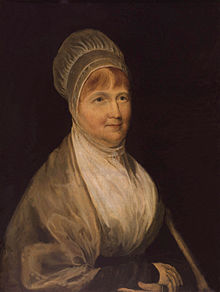Elizabeth Fry
| Elizabeth Fry | |
|---|---|

Elizabeth Fry
|
|
| Born |
Elizabeth Gurney 21 May 1780 Norwich, England |
| Died | 12 October 1845 (aged 65) Ramsgate, England |
| Cause of death | Stroke |
| Spouse(s) | Joseph Fry (19 August 1800 – 12 October 1845, 11 children) |
Elizabeth Fry (née Gurney, often referred to as Betsy; 21 May 1780 – 12 October 1845) was an English prison reformer, social reformer and, as a Quaker, a Christian philanthropist. She has sometimes been referred to as the "angel of prisons".
Fry was a major driving force behind new legislation to make the treatment of prisoners more humane, and she was supported in her efforts by the reigning monarch. She was depicted on the Bank of England £5 note from 2001-2016. Winston Churchill now shows on the £5 note.
Elizabeth Gurney was born in Gurney Court, off Magdalen Street, Norwich, Norfolk, England into a prominent Quaker family, the Gurneys. Her childhood family home was Earlham Hall, which is now part of the University of East Anglia. Her father, John Gurney (1749–1809), was a partner in Gurney's Bank. Her mother, Catherine, was a member of the Barclay family who were among the founders of Barclays Bank. Her mother died when Elizabeth was twelve years old. As one of the oldest girls in the family, Elizabeth was partly responsible for the care and education of the younger children, including her brother Joseph John Gurney, a philanthropist. One of her sisters was Louisa Gurney Hoare (1784–1836), a writer on education.
At the age of 18, Elizabeth was deeply moved by the preaching of William Savery, an American Quaker. Motivated by his words, she took an interest in the poor, the sick and prisoners. She collected old clothes for the poor, visited the sick in her neighbourhood and started a Sunday school in the summer house to teach children to read.
...
Wikipedia
